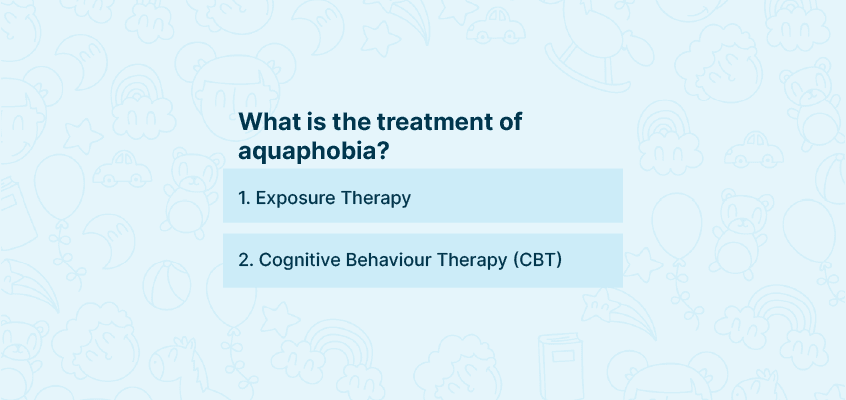Introduction
Phobia is a persistent, unrealistic fear of species and inanimate objects. Any type of fear is categorised as phobia, considering no logical explanation. The fear is so traumatising and distressing that it can physically or mentally harm one’s well-being.
What is fear of water/aquaphobia?
We know that 3/4th of the earth is water; the fear of water is not uncommon. Moreover, most people fear and anxiety regarding water and drowning. Though general fear of water is okay, it is considered a phobia when the fear reaches irrational levels. People experiencing aquaphobia have an irrational fear of water; they can get scared even in the most mundane conditions. They develop a significant level of anxiety in the presence of water, such as swimming pools, rivers, lakes, or even water in their bathtubs. Hydrophobia and aquaphobia are not the same. Though both include water, patients having hydrophobia are affected by the later stage of a rabies infection.

What are the symptoms of fear of water/aquaphobia?
Symptoms of aquaphobia, in general, are almost similar to most phobias. People experiencing aquaphobia can get extremely anxious and freeze near any water body or panic when thinking about water. This fear also limits one’s ability to socialise because of the intense anxiety and a sense of fear and aversion around water bodies. People who have aquaphobia are likely to show the following symptoms:
- One may experience increased vitals like a rapid heartbeat accompanied by sweating, chills, and shallow breath.
- Intense fear causes dry mouth, numbness, and pain or tightness of the throat and chest.
- Sudden freezing near the presence of water and unable to move.
- Prolonged exposure to fear and trauma causes dizziness or nausea
- Confusion and disorientation.
However, children with aquaphobia can express anxiety and fear by crying, refusing to move or speak, or clinging to someone or something.
What are the causes of aquaphobia?
The root cause of the development of phobias is unknown, but science says that a traumatic experience, primarily experienced during childhood, is the reason behind any type of phobia. Phobia is a learned behaviour. When we share anything too distressing and traumatising or succumb to injuries, our brain associates that incident with an immense fear of a phobia.
Aquaphobia causes due to several reasons. Mostly it has been found that the phobia roots in the unconscious mind and experiences in childhood like:
- Experiencing something negative related to water, such as accidents or injuries while swimming.
- A child might have had death experiences, such as drowning in a river, pool, or lake.
- A child might have witnessed someone getting drowned.
- Experiencing something awkward, just like coming across any unknown object or animal in the waterbody.
Often, external stimuli like a movie or an image can also cause fear. For example, research shows that after the release of the movie Jaws, many children were afraid to get into the water for fear of sharks.
What is the treatment of aquaphobia?
Aquaphobia is treatable through therapy. Contacting a licensed mental healthcare provider to diagnose the phobia and treat it accordingly is advised. The form of treatment is mostly psychotherapy and counselling. Medicines are of two types, Exposure Therapy and Cognitive Behaviour Therapy (CBT).
Exposure Therapy
It works by slowly exposing the person to water and water-related objects in a controlled environment, such as showing pictures of water or water-related things and monitoring reactions. Progressive exposure therapy has helped many people take control of their phobia and make them more confident. The healthcare provider can also give specific exercises that will help the person calm down and relax, thereby slowly taking hold of the dread. Psychotherapy works only when the patient is open to their fears and can face them. The counsellor or mental healthcare provider will help the patient interact with water-based fun games and teach them how to relax in the presence of water and gradually let go of the fear of water.
Cognitive Behaviour Therapy (CBT)
Apart from exposure therapy, another effective type of therapy is cognitive behaviour therapy (CBT). The CBT is more of a one-to-one conversation to get into the depth of the patient’s mind and help the person ease the fear from within. In CBT, the counsellor or mental healthcare provider helps control the irrational fear of water and monitor behavioural changes throughout the sessions. CBT is highly effective and allows patients to ease anxiety and panic attacks every time they contact water. It also helps control the thoughts responsible for anxiety, confusion, and aversion. Many prefer CBT to be better than exposure therapy. CBT is more internalised, and the control comes from within, while in exposure therapy, the power is from the environment. Unmonitored exposure therapy can lead to more severe consequences where the patient may get engrossed in more trauma. After the CBT sessions are over, the person can practice CBT by themselves to restrict any irrational fear or thoughts that might trigger a panic or anxiety attack.
How to overcome aquaphobia?
Overcoming fear of water or aquaphobia can be tricky unless therapy is taken and practised regularly. Always address your fear to yourself and try to face it. It is okay to be scared at first, but addressing the fear and overcoming it is the real deal.
At first, it is best to take baby steps and try to get comfortable around water in a controlled environment, like a pool or a bathtub. Letting go of anxiety and fear is the main deal and accepting the way it is. It may be highly overwhelming initially, but once you’ve got yourself acquainted with water, things will lighten up more. Practising swimming or water-related fun activities will help ease all the anxiety and fear. Visiting water parks and pool parties is a great way to deal with the fear of water and get over it.
How can infographics help?
An infographic is a collection of visual graphics, like charts, graphs, or photos, that helps present critical information. Since visual representation often gets registered quickly by our brain, any information presented in that form is processed quite easily and quickly. Therefore, infographics effectively treat all kinds of phobias, including aquaphobia.
The images used to treat aquaphobia may include all the information we have discussed so far, including what is meant by fear of water, its symptoms, causes, treatment methods, and ways to overcome it. Therapists may usually present the images stepwise for clarity and quick grasping.
Conclusion
Aquaphobia is common, and many people have it, considering the dangers lurking in the water. However, aquaphobia can be treated through therapies and proper guidance, allowing a person to take control of the phobia. One can easily conquer internalised aquaphobia if their minds are strong enough through treatments. So go ahead and get help through online and offline therapies and counselling here.











